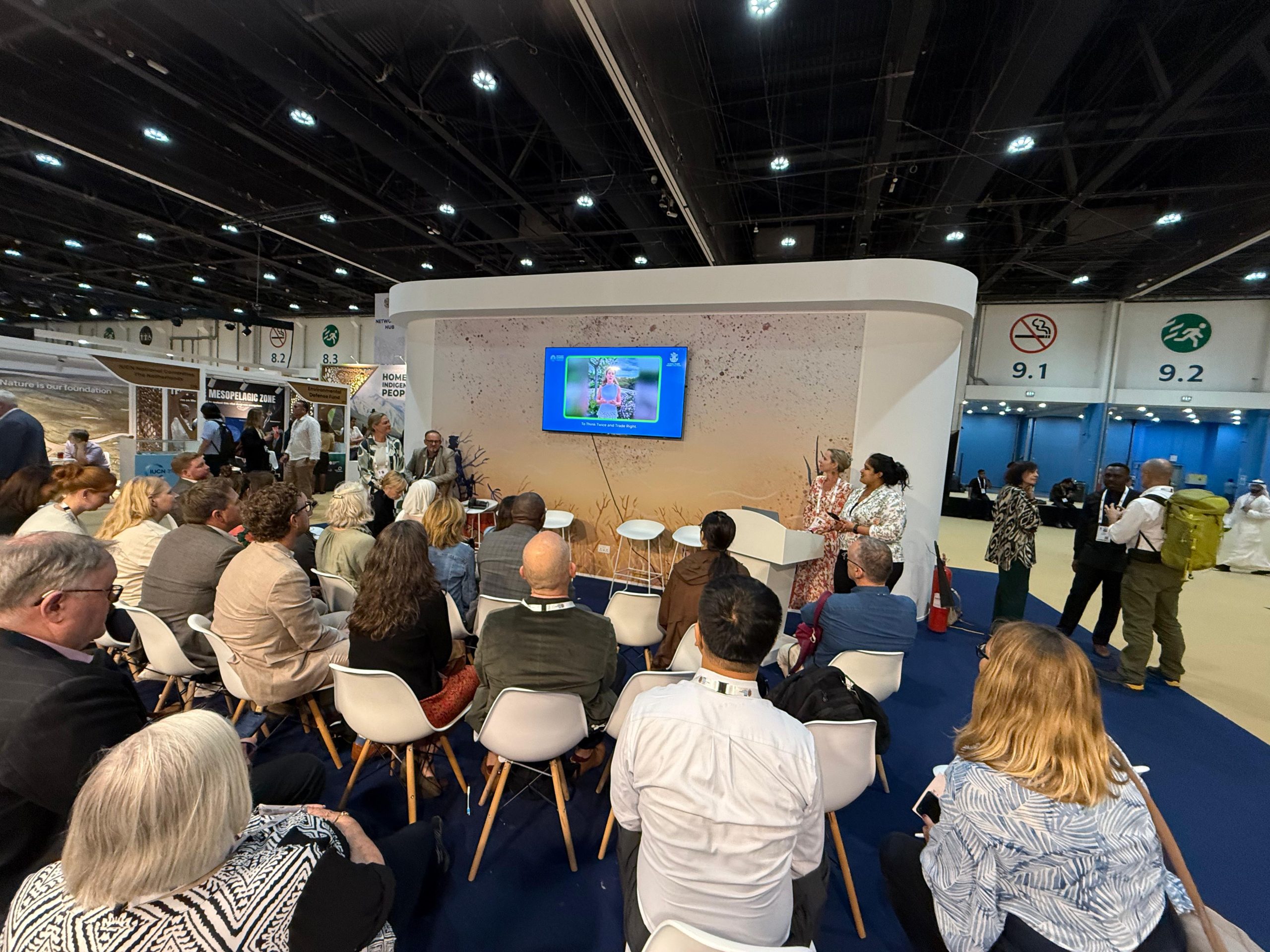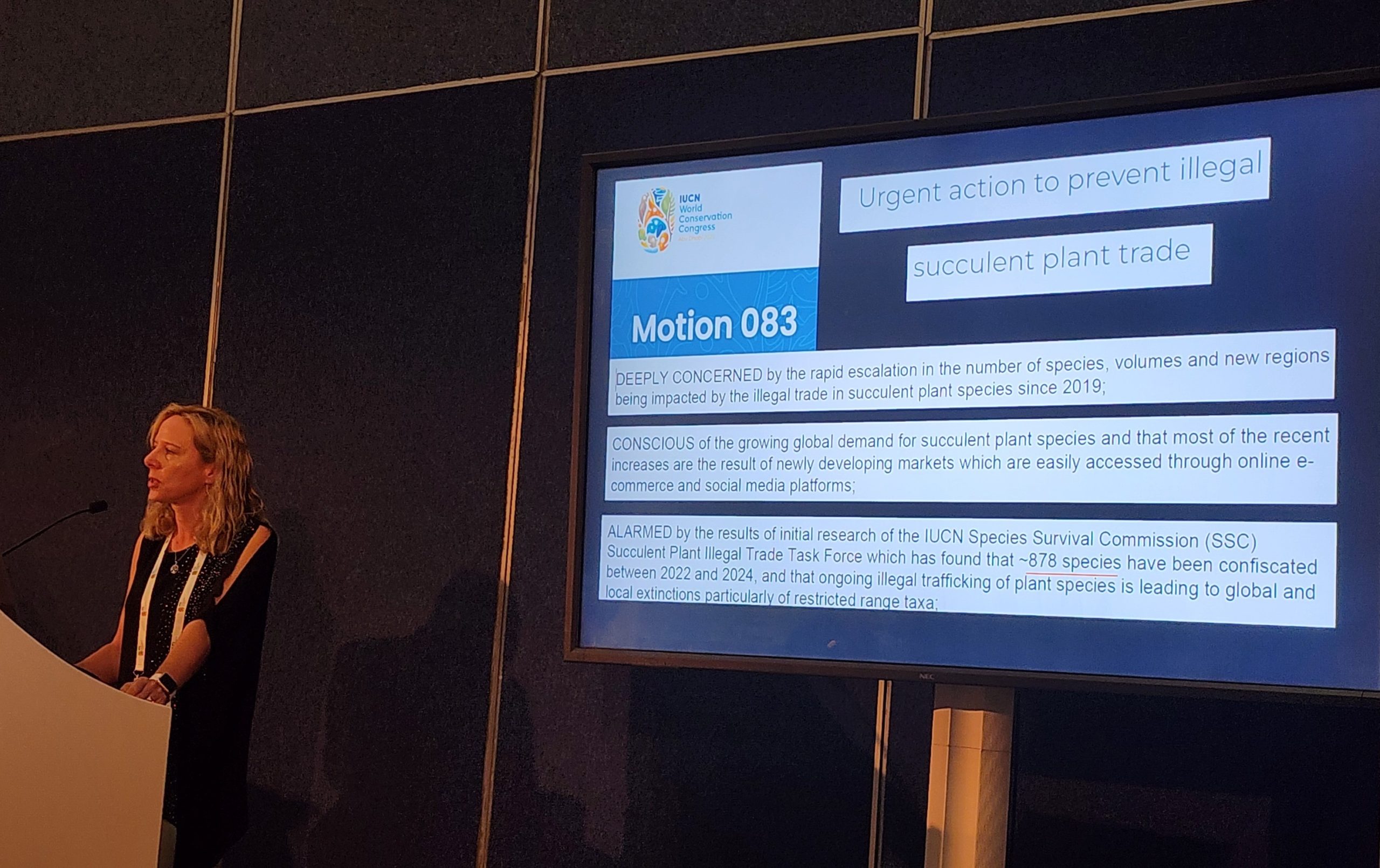Illegal Plant Trade Coalition: Highlights from the IUCN World Conservation Congress, Abu Dhabi 2025
-
Country
Qatar -
Region
Global -
Programme
BGCI -
Workstream
Saving Plants -
Topic
Conservation Prioritisation -
Type
News -
Source
BGCI
News published: 18 November 2025
Highlights from the IUCN World Conservation Congress, Abu Dhabi, 2025
The IUCN World Conservation Congress (WCC) in Abu Dhabi brought together one of the largest gatherings in IUCN history, around 10,000 participants, 140 pavilions, and over 1,000 events! For the Illegal Plant Trade Coalition (IPTC), the Congress served as a powerful platform to elevate illegal flora trafficking onto the global conservation agenda with unprecedented visibility.
Official Launch of the IPTC
The Congress opened with a momentous milestone for the Coalition: the official launch of the Illegal Plant Trade Coalition. The session was honoured by HRH Princess Basma bint Ali of Jordan and joined by in-person representatives from BGCI, The Huntington, The South African National Biodiversity Institute, IUCN The IUCN Commission on Education and Communication, and Toronto Zoo. To hear from our Steering Committee, including Longwood Gardens and United States Botanic Garden and the Coalition’s Action Partners please see our video.
Delivered in a refreshing storytelling-style setting by the representatives, the launch drew a diverse audience from academics and horticultural professionals to government agencies and enforcement authorities. The shared commitment in the room underscored what we already know that there is a growing global appetite to better understand, address, and collaborate on the illegal plant trade.

The launch showcased months of preparation behind the Coalition’s strategy, social media presence, onboarding materials, and foundational tools. Seeing the Coalition come alive and witnessing the enthusiasm it generated felt deeply rewarding and affirmed the momentum already building behind this work.

Panel: Drivers of Illegal Trade in Fungi, Flora, and Fauna
One of the most dynamic sessions for the IPTC was the panel exploring the drivers of illegal trade across plants, animals, and fungi. Expert speakers Carly Cowell, Jeffrey Stallman, Rima Jabado, and Giovanni Broussard guided by moderator Kathryn Gwiazdon highlighted both distinct challenges and interconnected patterns across taxa.
For flora, the discussions highlighted key barriers including low enforcement prioritisation, rising digital market pathways, and the challenges of detection compared to wildlife trade in fauna. The IPTC’s work was repeatedly referenced as timely and essential for bridging knowledge gaps and the needs for collaboration across the different taxa that have different challenges but also overlaps.
IPTC Poster Session & Community Engagement
Our dedicated poster session attracted interest from very diverse audiences including individuals simply interested to learn. Attendees engaged with the Coalition’s approach, shared insights from their own regions, and initiated conversations about future partnerships and knowledge sharing opportunities. The cross disciplinary curiosity reinforced the need for a unified, global mechanism exactly what the IPTC is designed to provide.
Species Recovery and Illegal Plant Trade: A Focus on Success and Reflection
A highlight in the week, was when the IPTC participated in the Reverse the Red pavilion through the “Celebrating Success: Species Recovery” session. Bringing together speakers from Bird Conservation Nepal, the IUCN SSC, and BGCI, the session showcased recovery stories across taxa, including flora impacted by illegal trade. The story of Eruca verticillata an endemic heather from Cape Town South Africa, once thought extinct due to over harvesting for cut flowers was shared.
Moderating the session offered the opportunity to emphasise a key IPTC message: successful species recovery demands we engage with the drivers of loss including illegal harvesting and that we learn as much from “failures within success” as from victories. This narrative resonated strongly with the audience, setting the stage for more nuanced conversations throughout the Congress.

Key IUCN Motions with Relevance to Illegal Plant Trade
The final days of the Members’ Assembly were particularly energising, with 144 Resolutions and Recommendations adopted. Several motions hold direct relevance for illegal plant trade and broader IPTC priorities and were successfully adopted as resolutions:

Motion 083 – Addressing the Illegal Trade in Succulent Plants
A landmark moment for the IPTC, this motion acknowledges the urgency of illegal flora trafficking and calls for stronger measures across source, transit, and market countries. It establishes a formal foundation for elevating illegal plant trade in global conservation and enforcement efforts aligning perfectly with the Coalition’s mission.
Motion 001 – Plant the right tree in the right place for the right purpose
This motion reinforces the importance of biodiversity informed, ecologically sound restoration. For the IPTC, it strengthens the global case against unsustainable or illegally sourced planting material, supporting ethical supply chains and discouraging illicit sourcing for reforestation and landscape projects.
Motion 061 – Recognition of Ecocide as an International Crime
A significant step forward for environmental justice, this motion recognises large-scale environmental harm as a potential international crime. For flora, this opens doors for improved legal accountability where illegal harvesting, habitat destruction, or commercial exploitation cause irreversible ecological damage.
What This Means for the IPTC?
Across the Congress, one theme became impossible to ignore: flora is finally, slowly but unmistakably claiming its rightful place in global conservation dialogues. The IPTC’s presence, events, and contributions helped reinforce that shift.

The Coalition is now entering its next phase with:
A strengthened global visibility after our launch at IUCN WCC through which we can now reach a wider audience, and we have formal policy backing from adopted IUCN motions. We can confidently say that we have succeeded in expanding our network and messages across conservation, enforcement, horticulture, and academia, and have growing interest from new potential partners wishing to collaborate. To read more about the work done by the Coalition partners please access our newsletter here.
The Congress closed with a clear message: conservation is evolving and the illegal plant trade is no longer a peripheral issue; it is recognised as central to global biodiversity protection.
The IPTC is proud to be part of this shift, and we look forward to building on the energy and commitments shared in Abu Dhabi.
Thank you to all those who contributed to the outputs we shared at the IUCN WCC, those who attended in person and to all of you reading this, who have showed unwavering support!
Support BGCI
You can support our plant conservation efforts by sponsoring membership for small botanic gardens, contributing to the Global Botanic Garden Fund, and more!
Calling all Experts
As a membership benefit exclusively for BGCI Institutional Members, staff associated with these institutions can apply for inclusion in BGCI's Directory of Expertise.